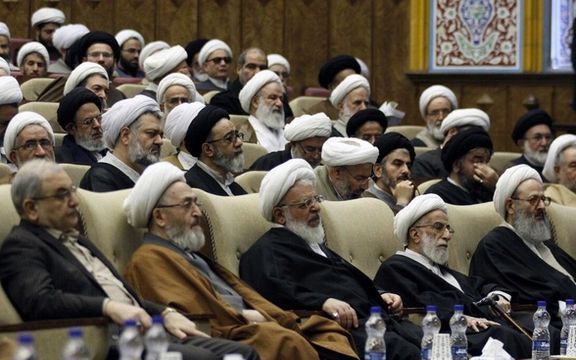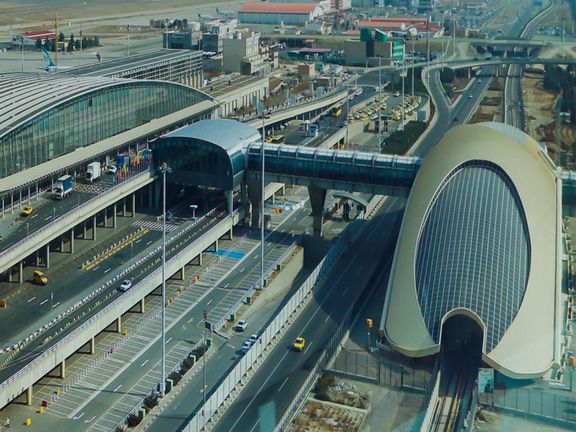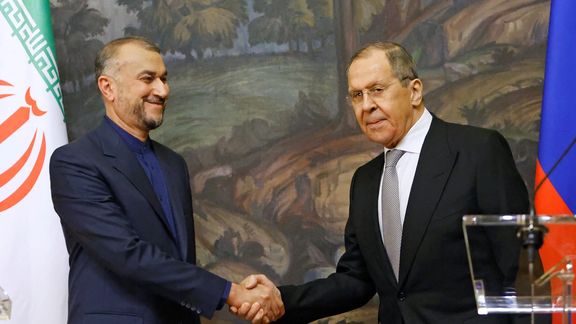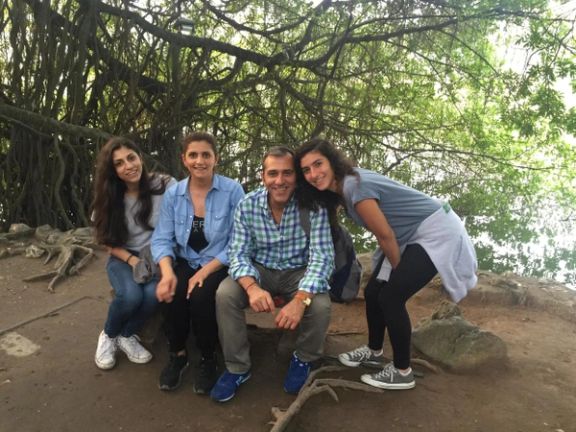Mayor In Iran Resigns After Scandal Over Deadly Collapse Of Building

The mayor of Iran's southwestern city of Abadan, which was the hotbed of protests after the deadly collapse of a high-rise building on May 22, has resigned.

The mayor of Iran's southwestern city of Abadan, which was the hotbed of protests after the deadly collapse of a high-rise building on May 22, has resigned.
Hossein Hamidpour, who was reportedly arrested along with five preceding mayors and another five city officials involved in the construction of Metropol Twin Towers project, resigned on Saturday.
The city council appointed Mohammadreza Motavvar, the head of Abadan’s urban development organization, as the new caretaker of the municipality.
Hamidpour, who appeared at the scene of the incident in the early hours after the collapse, was reportedly beaten and booed by the angry residents.
According to reports, the bodies of 40 victims of the collapse have been recovered but an equal number of people are still missing.
Soon after the collapse it became apparent that the owner and builder of the building, Hossein Abdolbaghi, was a powerful and politically well-connected businessman who had disregarded regulations and building codes, being backed by officials, who might have had their own financial interests.
Journalists and social media users accuse authorities of covering up his escape by claiming that he died in the incident.
The collapse of the building led to protests in Abadan as well as in several other cities across Khuzestan who took to the streets to demand accountability. The incident also had national ramifications as an example of government corruption.

An influential Shiite seminary group and senior Ayatollah Hossein Noori Hamedani, have expressed their dissatisfaction over Iran's current political and economic situation.
In a statement issued earlier this week, the Association of Qom Seminary Lecturers and Researchers on the death anniversary of Rouhollah Khomeini, the founder of the Islamic Republic, said that "four decades after the Islamic revolution Iran's political and economic systems are still inconsistent with the ideals and promises of the revolution."
The statement accused Iran's Islamic government of being responsible for widespread poverty, rising inflation, high prices, and financial corruption in the country.
The clerics said it is odd that despite all the promises made to the people, economic and pollical crises have heightened under the current government following the consolidation of hardliners’ control over the state.
Elsewhere in the statement, citing the holy Koran, the Association of Qom Seminary Lecturers and Researchers advised the government to stop oppression and follow a rational approach.
Meanwhile, criticizing the government for what President Ebrahim Raisi and other Iranian officials call "economic surgery," and some other officials label as "a test by God," the statement charged that these are excuses made by a government which has no economic plan. The statement said that allowing naïve officials to do ‘the surgery’ is like giving a sword to a drunken man. Other clerics have asked during the week: "Why the officials think God only needs to test the Iranian people?"
The Raisi government stopped billions of dollars in food import subsidies in early May, which led to an overnight jump in bread and other food prices. Officials insisted that the ‘economic surgery’ was necessary to help the country’s ailing economy.
The statement also harshly criticized the government for its inability to further nuclear talks with the West that could lead to the lifting of sanctions on Iran. It charged that "officials who say the fate of the negotiations should not be tied to the people's livelihood know very well that their financial problems are linked to the nuclear talks."
The seminarians further said that "the current situation has made opportunists and profiteers rich while taking away the bread from the poor people's dinner table." They also charged that "the government's over-reliance on Russia and its support of Moscow dealt a big blow on Iran's economy."
Referring to the government's weakness in dealing with the aftermaths of the collapse of a high-rise building in Abadan, the seminarians blamed the corruption and a lack of accountability for the tragedy that has led to the death of at least 40 people.
The statement charged that "political and economic corruption have spread the ranks of the regime while critics do not feel secure to voice their ideas."
In another development, the Jonhouri Eslami newspaper quoted prominent cleric Hossein Noori Hamedani as saying that the state-run media refuse to broadcast his criticism of rising prices that have imposed hardships on the people.
He said, "the people wonder why top clerics do not say anything to the government in the face of policies that lead to rising prices. The people should know that clerics at the seminary offer their advice but state-run media refuse to broadcast them.
Meanwhile, Aftab News website criticized the government-owned media of adding insult to injury by ignoring the sharp fall of the Iranian currency and publishing and broadcasting strange reports to whitewash the government's shortcomings.

The passport control system at Tehran's Imam Khomeini International Airport was reportedly hacked on Saturday, stranding passengers for a couple of hours.
The spokesman of the airport, Javad Salehi, however, rejected the reports of a cyberattack, saying the incident that created long queues of passengers at the airport’s terminals was caused by a technical glitch.
Emphasizing that penetrating the system was impossible, he said the technical issue was due to a problem between the online and offline servers of the system.
Salehi claimed the airport system is not connected to the Internet so it cannot be attacked or hacked, saying the system is based on a very secure intranet.
Colonel Mohammad Haydari, the manager of the airport’s Aerial Border Control, said the incident caused a brief delay of about 15 minutes in flights.
Also on Saturday, an Iran Air jetliner, which departed from Tehran for the Iraqi city of Najaf, had to make an emergency landing in the central city of Esfahan due to a technical failure. It was the third such incident of the airliner in about a week.
On Thursday, a largescale cyberattack by an Iranian hacktivist group calling itself ‘Uprising till Overthrow' targeted over 5,000 surveillance cameras and 150 websites and online services of Tehran Municipality, deactivating the cameras and putting anti-regime content on the websites.

Russia has joined China in opposing a possible resolution from the United States and ‘E3’ condemning Iran at next week’s meeting of the UN nuclear watchdog.
Following a report from the United Nations’ International Atomic Energy Agency this week expressing dissatisfaction at Iran’s answers to queries over its pre-2003 nuclear work, the US and E3 – France, Germany, and the United Kingdom – have been discussing moving a resolution at the 35-member IAEA board meeting June 6-10.
Russian Foreign Minister Sergei Lavrov told Iranian Foreign Minister Hossein Amir-Abdollahian Friday that Moscow was in “definite opposition” to such a move The Iranian foreign minister told Lavrov that such a resolution would contradict the diplomatic process wherebyTehran and Washington exchanged notes over the past two months through Europeans.
Echoing a Chinese view expressed Thursday, Lavrov said that such a resolution would have “no positive impact” and that “issues of cooperation between IAEA and Iran should be resolved within IAEA’s technical path.”
Over the past year, the US and E3 have held back from moves critical of Iran’s co-operation with the IAEA so as not to undermined negotiations in Vienna over reviving the 2015 nuclear deal, the JCPOA (Joint Comprehensive Plan of Action), which the US left in 2018.
But questions over Iran’s pre-2003 nuclear work, and alleged lack of transparency over it, were recently revived by documents from 2004-5 released by Israel purporting to show Iranian efforts to hoodwink IAEA inspectors using information gleaned from purloined agency documents. This has blurred the distinction between the supposed ‘technical’ issues dealt with the agency and the ‘political’ process of JCPOA renewal.
‘Shrinking’
The administration of President Joe Biden, which came to office committed to re-joining the JCPOA as a means to gain cap Iran’s nuclear program, has insisted that not all US sanctions put in place by the previous administration of President Donald Trump contravene the 2015 agreement. Reports have suggested the 2019 listing of Iran’s Revolutionary Guards as a ‘foreign terrorist organization’ is a particular sticking point.
Joseph Borrell, the European Union foreign affairs chief, tweeted Saturday after a phone-call to Amir-Abdollahian that while the chance of reviving the JCPOA was “shrinking,” it could still be done “with an extra effort.” Borrell wrote he would “stand ready any time to facilitate a solution to the latest outstanding issues.”
US State Department Spokesman Ned Price said May 31 that the JCPOA revival was “absolutely within reach” and that the US would continue efforts to revive the deal as long as this held out clear non-proliferation benefits. But Iran’s accumulation of uranium enriched to 60 percent, the most serious violation of its JCPOA limits since 2019, has strengthened domestic criticism of Biden, both from JCPOA critics and from those arguing Biden needs urgently to revive the agreement.
Price Friday cited Secretary of State Antony Blinken speaking with Oman’s Foreign Minister Sayyid Badr al-Busaidi to thank him for efforts to mediate both over the current truce in Yemen and to discuss Iran.

An Iranian aerospace engineer said to have worked on developing missiles and drones at a research and development center in the central city of Yazd has died under suspicious circumstances.
Ayoob Entezari, who held a PhD in Mechanical and Aerospace Engineering from Tehran’s Sharif University, died last week with some reports mentioning food poisoning as the cause of his death, Iranian and Israeli media reported on Saturday. He reportedly took part in several projects at the Yazd Institute of Technology.
The circumstances surrounding his death are shady as some people on social media say the Iranian scientist was killed and Mossad is also mentioned in some reports as being responsible but no official source has yet spoken out about his death.
The reports came a day after Iran confirmed the death of another colonel from the Quds Force, Ali Esmailzadeh of the Islamic Revolutionary Guard Corps, the second in two weeks from the unit which allegedly oversees terror operation abroad.
Iranian government and IRGC media said that Col. Esmailzadeh died “in an incident in recent days” at his home without mentioning any details after Iran International quoted sources in Iran as saying that the IRGC killed him over suspicions of espionage. Officials of the Revolutionary Guard told Esmailzadeh’s family that the reason for his death was suicide.
He was a close colleague of Colonel Hassan Sayyad-Khodaei, the acting commander of the elite Qods Unit 840, who was earlier shot dead behind the wheel of his car outside his home in Tehran on May 22 by two gunmen who fled the scene on a motorbike.

The family of Emad Sharghi (Shargi), an American-Iranian dual citizen jailed in Iran since 2018, made an appeal to the US president to "do anything" in his power to bring him home.
In an exclusive interview with CBS News on Friday, Sharghi’s wife and two daughters said they have requested a meeting with Joe Biden "numerous times," including as recently as ten days ago, but has so far not received a response from the White House.
"Really what we would like is to sit in front of the president and tell our story and beg him — because he is the only one that can make the decision to bring Emad and the other hostages home," said Bahareh, Emad's wife.
"We really hope that the administration puts patriotism over politics and brings these Americans home," said Emad's 25-year-old daughter Ariana.
In April, which marked four years since Sharghi’s detention, US Secretary of State Antony Blinken and Special Envoy for Iran Robert Malley called on Iran to release Sharghi and stop its policy of holding people as political pawns.
The 56-year-old businessman has been sentenced to ten years in prison on charges of espionage and collecting military intelligence but had attempted to flee while on bail awaiting the result of an appeal.
Foreign governments and human rights organizations have accused Iran of detaining foreigners and dual nationals on trumped up charges to use them for getting concessions from Western countries.